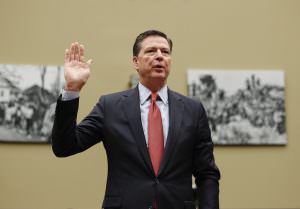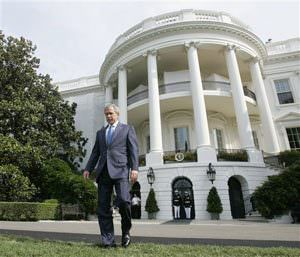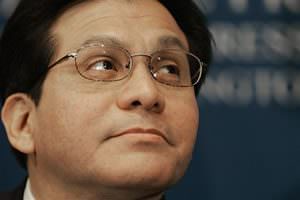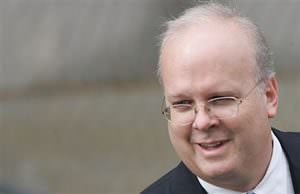From Fired U.S. Attorneys to Sarah Palin
A new internal report confirms our fears about the politicization of the Justice Department. That same contempt for government can be found in the current financial crisis as well as the meteoric rise of the former mayor of Wasilla.With Wall Street’s fate hanging in the balance, and with Sarah Palin’s incoherence sparking interest in Thursday’s vice presidential debate, it was easy to overlook another major story Monday that got less attention than it deserved. The Justice Department released a nearly 400-page report with this jaw-dropping bottom line:
“Our investigation found significant evidence that political partisan considerations were an important factor in the removal of several … U.S. attorneys.”
Remember the controversy over the sudden dismissals of nine U.S. attorneys? Remember the allegation that the Bush administration had sullied the long-held principle that justice should be administered in an impartial, nonpartisan way? Remember the questions about what then-Attorney General Alberto Gonzales knew and when he knew it? Remember Kyle Sampson, the Gonzales aide who played a key role in the firings? Remember Monica Goodling, the White House liaison who went so far as to ask prospective Justice appointees to wax eloquent about why they wanted to “serve” George W. Bush?
The Justice Department conducted as thorough an investigation as it could, and concluded that there was evidence of White House political meddling in “at least three of the removals.” The joint probe by the department’s Office of Inspector General and Office of Professional Responsibility recommended further investigation to determine “whether the totality of the evidence demonstrates that any criminal offense was committed.”
The investigators reported being stonewalled by the White House, saying they were unable to look at all the evidence “because of the refusal by certain key witnesses to be interviewed by us, as well as by the White House’s decision not to provide internal White House documents to us.”
In other words, as far as the team of investigators could determine from the limited evidence they were allowed to uncover, what we suspected and feared seems to have been true. The Bush administration seems to have removed at least three federal prosecutors — who are supposed to be evenhanded and apolitical in the way they do their jobs — for partisan political reasons.
The report says “it appears” that Missouri U.S. attorney Todd Graves “was told to resign because of a political dispute among Missouri politicians, not because of an objective assessment of his performance.” Specifically the dispute was between Republican Sen. Christopher S. “Kit” Bond and his brother, a Republican congressman.
Arkansas U.S. Attorney Bud Cummins “was not removed for any performance reasons,” the report says. “Rather, the evidence shows that the main reason for Cummins’ removal was to provide a position for former White House official Tim Griffin.”
The most egregious case, according to the report, was that of New Mexico U.S. Attorney David Iglesias. The evidence showed that Iglesias was removed because of complaints from Republican Sen. Pete Domenici and other GOP officials and party activists who believed he was not being aggressive enough in pursuing certain voter fraud and public corruption cases — by happenstance, cases against Democrats.
Gonzales and his deputies at Justice never looked into Iglesias’ handling of those cases, and in fact never even asked him about them. They just fired him.
The investigators wanted to ask White House political czar Karl Rove, White House counsel Harriet Miers, Goodling, Domenici and Domenici’s chief of staff about any role they played in Iglesias’ dismissal. All refused to be interviewed.
In releasing the report, Attorney General Michael Mukasey announced that he had ordered a new investigation to “pursue this case wherever the facts and the law require,” including possible criminal charges. By most accounts, Mukasey has taken pains to cleanse Justice of the partisan taint that Gonzales left behind. Whatever ultimately comes of this disgraceful episode, however, we already know enough to put it in context.
The people who have been running our government for the past eight years have nothing but contempt for government. They believe only in politics and ideology, in that order. First, win elections by any means necessary. Second, once in a position to act in the public good, govern with the ideological conviction that government is either irrelevant or harmful to the public interest.
You can draw a straight line between firing U.S. attorneys for political reasons and turning a blind eye to the ruinous excesses of Wall Street. What’s impartial justice against the possibility of gaining political advantage? Why shackle the hallowed free market with government oversight?
And, if you want to draw the line a little farther, who cares if the prospective vice president appears to know nothing about anything?
Eugene Robinson’s e-mail address is eugenerobinson(at)washpost.com.
© 2008, Washington Post Writers Group
Your support matters…Independent journalism is under threat and overshadowed by heavily funded mainstream media.
You can help level the playing field. Become a member.
Your tax-deductible contribution keeps us digging beneath the headlines to give you thought-provoking, investigative reporting and analysis that unearths what's really happening- without compromise.
Give today to support our courageous, independent journalists.






You need to be a supporter to comment.
There are currently no responses to this article.
Be the first to respond.